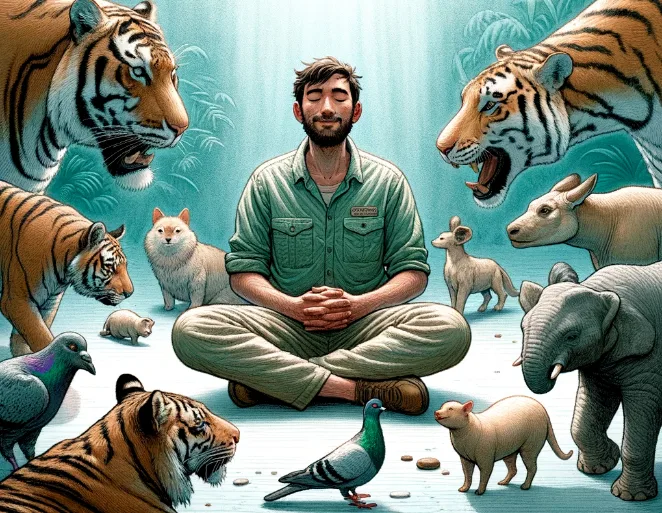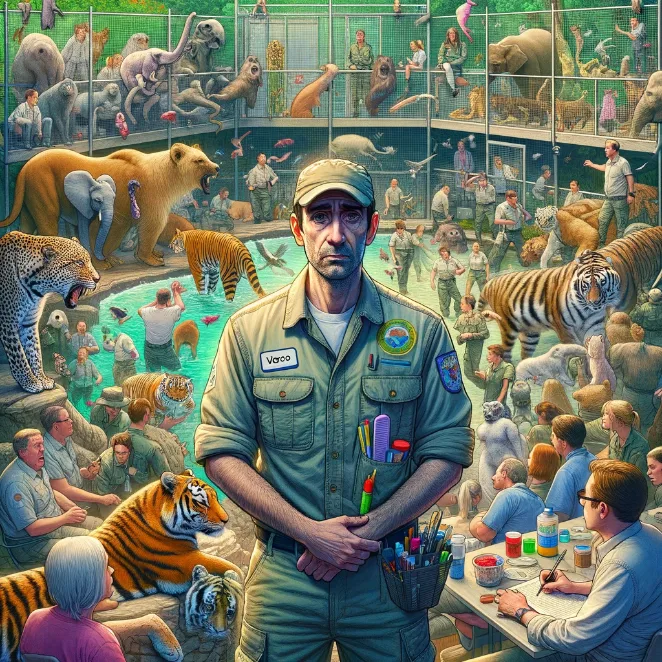
Zen in the Zoo: The Keeper's Calm
In the world where nature's rawness meets human care, Alex Hartman's story stands out as a beacon of serenity and balance. Working as a zookeeper at the bustling city zoo, Alex discovered an unexpected ally in meditation, reshaping not only his professional approach but also his personal outlook. Amidst the roars, chirps, and rustles, his journey into mindfulness offers a unique lens to view the chaotic yet rewarding world of zookeeping. This tale is more than about tending to wild animals; it's about cultivating an inner peace that echoes through the cages and enclosures. It underscores how meditation can serve as a bridge between the demanding tasks of zookeeping and the quest for personal tranquility.
article by Hina Kurosawa
The Chaos of Caring: Life as a Zookeeper
Each day, Alex faced a labyrinth of responsibilities, from feeding predators to nurturing the young, each requiring undivided attention and precise care. "You're constantly on alert, always ready to respond to any situation," he describes. The unpredictable nature of wild animals, coupled with the immense responsibility of ensuring their health and safety, often resulted in a high-stress environment. Even the most routine tasks were fraught with potential for sudden challenges. This relentless pace began to wear on him, with stress becoming an ever-present shadow in his life. His dedication to the animals was unwavering, but the mental and emotional toll it took began to surface, threatening to overwhelm his passion for his work.

A Moment of Peace: Discovering Meditation
Alex's journey into meditation began unexpectedly, during a casual conversation with a colleague about stress management. "She mentioned how meditation had helped her find balance in her high-pressure job. I was desperate for anything that could bring some peace," he recalls. Initially skeptical, Alex's curiosity led him to explore meditation, starting with brief sessions that slowly became a cherished part of his day. The early morning stillness of the zoo became his sanctuary, where he could sit quietly, focusing on his breath, away from the day's demands. "In those moments, I found a peace I hadn't known in years," he reflects. This practice of mindfulness started to seep into his daily interactions, gradually altering his approach to both his work and life.
Mindfulness Among the Wild
As Alex's meditation practice deepened, he began to notice a significant shift in his interaction with the animals. "There was a newfound sense of calm in my movements, a patience I hadn't realized I was capable of," he notes. This change did not go unnoticed by the animals; they responded to his calmer demeanor with a noticeable ease in their behavior. His heightened sense of awareness allowed him to anticipate and address the needs of the animals more effectively, enhancing the quality of their care. The once overwhelming tasks became opportunities for mindful practice, each requiring a presence that meditation had honed within him. His colleagues began to take note of the positive changes, often seeking his advice on managing the day-to-day challenges of zookeeping.
The Ripple Effect: Beyond the Zoo
The influence of meditation extended far beyond the gates of the zoo. Alex found that he carried the tranquility from his morning sessions throughout his day, impacting his interactions with friends and family. "I started to approach my relationships with the same patience and presence I had with the animals," he shares. His personal life, once a secondary concern, took on new significance as he became more engaged and attentive. The practice of mindfulness had not only transformed his professional life but had also brought a newfound harmony to his personal relationships. The chaotic world of zookeeping had become a backdrop to a richer, more fulfilling personal life, guided by the principles of mindfulness.
Alex's Wisdom: Starting Your Meditation Journey
When asked for advice on beginning meditation, Alex speaks from his own transformative experience. "Start with just a few minutes a day, and don't be hard on yourself if your mind wanders," he suggests. "Find a quiet spot, maybe early in the morning or late at night, when you can be alone with your thoughts." He emphasizes the importance of making it a daily practice, even if it's just for a short duration. "Be patient and consistent. The benefits may not be immediate, but over time, you'll start to notice a difference in how you feel and react to things." Alex also recommends exploring different meditation techniques and finding one that resonates personally, as meditation is a deeply individual experience.

Alex Hartman's story is an inspiring account of how mindfulness can bring balance and peace to even the most dynamic and challenging environments. His journey from a stressed zookeeper to a mindful practitioner highlights the power of meditation to transform both professional and personal realms. In the midst of the wild, Alex found a way to cultivate an inner sanctuary, demonstrating that peace is attainable, no matter the external circumstances.
Published: 11/23/2023
Modified: 11/23/2023
More predictions
Come back here soon to learn more about yourself and your future


The Physiology of Meditation: What Happens Inside
Meditation, a practice that transcends cultures and centuries, offers more than just mental tranquility. Beyond its serene exterior lies a complex interplay of physiological processes that significantly impact the human body. As science delves deeper into these processes, the profound physical effects of meditation become increasingly evident, enhancing our understanding of this ancient practice. This article explores the intricate physiological changes that occur during meditation and their overarching impact on health and well-being.


Mindful Meditation: Resolving Conflicts with Awareness
In a world where disagreements and conflicts are inevitable, mindfulness emerges as a vital tool in navigating and resolving these challenges. Mindfulness, a state of being fully present and aware, can be transformative in conflict resolution. By incorporating mindfulness practices, such as meditation, individuals can approach conflicts with a clearer mind and a more balanced perspective. This article explores how mindfulness and meditation techniques can enhance conflict resolution skills, leading to more constructive and peaceful outcomes. Understanding this connection is essential for anyone seeking to resolve disputes effectively and maintain harmonious relationships.


The Ritual of Tea Ceremonies and Mindfulness
Tea ceremonies, steeped in tradition across various cultures, are not just about the act of drinking tea but are a form of art that embodies mindfulness and presence. These ceremonies, ranging from the Japanese Chanoyu to the Chinese Gongfu tea ceremony, offer a peaceful retreat from the hectic pace of modern life. This article delves into the serene world of tea ceremonies, exploring how this ancient ritual provides a unique opportunity for mindfulness practice. By participating in or observing these ceremonies, one can experience a profound sense of calm and focus, transforming the simple act of drinking tea into a meditative journey.